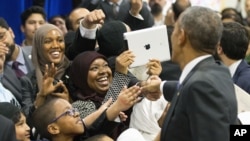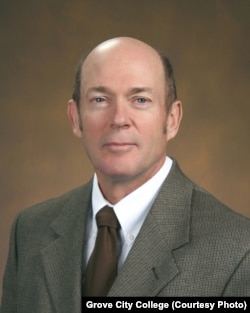President Barack Obama’s visit to a U.S. mosque Wednesday sent a strong message of support to American Muslims and, according to one scholar, continued a long tradition of U.S. presidents defending religious freedom.
For much of Obama’s presidency, now in its eighth year, Muslim community leaders have urged him to visit a mosque in the United States, just as he has overseas. His stop at the Islamic Society of Baltimore, "as overdue as it is, is symbolically quite important," Omid Safi, director of the Duke Islamic Studies Center in North Carolina, said in an email to VOA.
"In an age where [Republican] presidential candidates are talking about national registries for Muslims, of shutting down mosques and banning Muslim refugees," Safi continued, the president’s visit "is a simple but powerful affirmation of the fact that American Muslims are a part of the mosaic of American society. Hopefully, it will serve as a reminder of the need to affirm the full rights of all of us, regardless of faith and ethnicity."
Gary Scott Smith, historian and author of the 2015 book "Religion in the Oval Office," said he thinks the mosque visit was "a good move on [Obama's] part and shows some solidarity with Muslims to speak out on religious freedom."
Religious defender in chief
Smith described the role of U.S. president as "our interpreter in chief, our spiritual leader in some ways," defending the nation’s founding principles of religious liberty and tolerance. "That’s happened throughout our history."
"In the absence of a national church – and therefore someone to function as the Archbishop of Canterbury or the pope – we often look to the president not only as a national spokesperson" but also as "a religious spokesperson on important civil matters," said Smith, history department chairman at Grove City College in western Pennsylvania.
Often, those civil matters involve tragedy, such as the terrorist plane attacks of September 11, 2001, or a radicalized couple’s mass shooting attack in San Bernardino, California in December. Muslim extremists have been blamed in those incidents and others – and after each, Muslim American communities have reported experiencing hate crimes and bias.
Obama, in public comments, has resisted using the phrase "radical Islam." He explained his avoidance of the term at a conference last February, saying, "We are not at war with Islam. We are at war with people who have perverted Islam."
Obama has described himself as a Christian of “deep faith,” one who, through his upbringing in Hawaii and Indonesia, also has been exposed to Eastern and Muslim influences.
Yet some persist in wrongly identifying him as Muslim, insinuating he’s somehow un-American and, by extension, that other U.S. practitioners of the faith are, too.
A CNN/ORC poll last year showed 29 percent of Americans – and 43 percent of Republicans – believe the president is a Muslim. A new Pew Research Center poll shows 49 percent of Americans believe "at least 'some' U.S. Muslims are anti-American, including 11 percent who say 'most' or 'almost all'" fit that category.
The United States has an estimated 3.3 million Muslims, representing roughly 1 percent of the U.S. population, according to Pew. But because Muslims have the nation’s highest fertility rate, by 2050 they could become the nation’s second most-populous faith group after Christianity.
The new Pew poll shows half of Americans want the next president to refrain from criticizing Islam as a whole. But another 40 percent of Americans want blunt, tough talk about Islamist extremists. That percentage rises to two-thirds (65 percent) of Republicans and those leaning toward the GOP.
Another new survey, conducted by the Council on American-Islamic Relations, shows American Muslims favor Democrats in upcoming presidential primary elections.
A history of complaints
Historian Smith pointed out that Muslims aren’t the only faith group to feel besieged at times.
"We’ve had all kinds of religious groups saying their rights have been impinged upon," he said, noting that, for decades, there’s been "this perception that Christianity is being pushed out of the public square. ... It’s not just Muslims who are concerned about their freedom to worship."
Even the country’s first chief executive, George Washington, felt compelled to send "letters to various groups, including Jews, basically promising them that, as long as he was president, they were free to worship God as they chose," Smith said.
But, especially since the 20th century, "there’s been this trend toward ecumenicism," Smith added, citing presidents such as John F. Kennedy, a Catholic, and Jimmy Carter, a Southern Baptist, deliberately avoiding any show of favoritism.
"… We’ve gotten more inclusive over time as we’ve had more religious communities in the United States."
Correction: Grove City College is in western Pennsylvania, not in Philadelphia, as initially reported.
WATCH: Visiting Mosque, Obama Condemns Violence Against Muslim Americans







